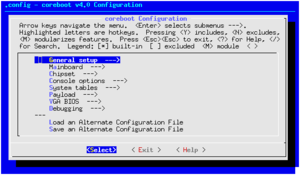Build HOWTO
The wiki is being retired!
Documentation is now handled by the same processes we use for code: Add something to the Documentation/ directory in the coreboot repo, and it will be rendered to https://doc.coreboot.org/. Contributions welcome!

This page describes how you can build a coreboot image for your specific mainboard.
Requirements
- gcc / g++
- make
- ncurses-dev (for make menuconfig)
Optional:
- doxygen (for generating/viewing documentation)
- iasl (for targets with ACPI support)
- gdb (for better debugging facilities on some targets)
- flex and bison (for regenerating parsers)
Building a payload
First you need to download the source code for the payload of your choice and build it.
Instructions for building the various payloads are not covered on this page, please see Payloads and the wiki page for the respective payload for details.
The result of this step should be an ELF file (e.g. filo.elf, or coreinfo.elf) which you can use with coreboot (see below).
Building coreboot
First, get the latest coreboot version from our git repository:
$ git clone http://review.coreboot.org/p/coreboot $ cd coreboot $ git submodule update --init --checkout
The last step is important! It checks out a sub-repository in the 3rdparty directory.
In the coreboot directory you can configure the build-time options of coreboot:
$ make menuconfig
In that menu (which may look familiar, as other projects such as the Linux kernel or busybox use the same system), select at least the following options:
- Enter the Mainboard menu.
- In Mainboard vendor select the vendor of your board.
- In Mainboard model select your exact mainboard name.
- In ROM chip size select the exact size of the flash ROM chip you want to flash the coreboot image on.
- Enter the Payload menu.
- By default, the SeaBIOS payload will be downloaded and built during the coreboot build process. If you want to use another payload:
- Set the Add a payload option to An ELF executable payload.
- Then, specify the file name and path to your payload file (which you built before).
- By default, the SeaBIOS payload will be downloaded and built during the coreboot build process. If you want to use another payload:
That's the bare minimum. Feel free to adjust the other settings to your needs (see Coreboot Options for the full list), then exit menuconfig and build the coreboot image:
$ make
The file build/coreboot.rom is your final coreboot image you can flash onto a ROM chip or add payloads to with cbfstool.
Known issues
With certain versions of the gcc/ld toolchain shipped in some Linux distributions, it's possible that you'll see the following error when building coreboot:
src/arch/x86/coreboot_ram.ld:129 cannot move location counter backwards
This is a known bug in those versions of the toolchain. Before sending a complaint message to our mailing list, please try to switch to our reference cross-compilation toolkit then recompile the sources. To switch to the cross-compiler just run
$ make crossgcc
Then remove the .xcompile file and retry the compilation process:
$ rm .xcompile $ make
Development version
If you want to contribute a patch or report an issue about coreboot, you will need to set up your environment for full development.
You must run make crossgcc and rebuild coreboot before reporting an issue or contributing a patch.
To get set up to submit a patch please run make gitconfig, then register with gerrit.
Flashing coreboot
You can flash the coreboot image on a flash ROM chip using either an external EEPROM-programmer or a mainboard using the flashrom user-space utility.